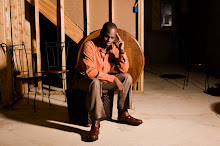AI Isnt so bad after all
A.I. Isn’t so bad after all.
Ever since Allen Iverson came into the league, he’s been looked at as a thug with too many tattoos, intimidating cornrows and a bad attitude (“It’s just practice!!”). But Iverson is putting most of those opinions to rest with his consistent high level of play on the court and his maturity off the court. Now Iverson has offered to pay for the funeral of Kevin Johnson, a fan who was shot three years ago after local thugs tried to take his Iverson jersey. Iverson said he’s tired of all the violence in the Philadelphia metro area. "I don't think one guy can do what needs to be done, but I think one guy can help," Iverson told the Associated Press. "I think it's going to take a collective effort and there are a lot of good people trying to help the situation in Philadelphia." On June 24, 2003 Johnson was waiting for a trolley when a group of teens told him to give up his jersey. When he refused one of the teens, Robert Ferguson (who is serving time for attempted murder), shot Johnson in the back of the neck and left him paralyzed and in a wheelchair. Eventually, Johnson had to breathe through a ventilator. Last week the ventilator failed causing irreparable brain damage and the family chose to take him off it. "If they were that serious about that jersey I would have given them 100 jerseys if they wanted it," Iverson said. "It was just tough, just to see somebody die for something senseless like that, over a jersey, over something material. I felt like I have got to do something more than what I have been doing to help this situation as much as I can. If I can reach one person and take one death away, I think I can do something." Johnson’s funeral was held on Wednesday, Nov. 22, and he was buried in an Iverson jersey.
Ever since Allen Iverson came into the league, he’s been looked at as a thug with too many tattoos, intimidating cornrows and a bad attitude (“It’s just practice!!”). But Iverson is putting most of those opinions to rest with his consistent high level of play on the court and his maturity off the court. Now Iverson has offered to pay for the funeral of Kevin Johnson, a fan who was shot three years ago after local thugs tried to take his Iverson jersey. Iverson said he’s tired of all the violence in the Philadelphia metro area. "I don't think one guy can do what needs to be done, but I think one guy can help," Iverson told the Associated Press. "I think it's going to take a collective effort and there are a lot of good people trying to help the situation in Philadelphia." On June 24, 2003 Johnson was waiting for a trolley when a group of teens told him to give up his jersey. When he refused one of the teens, Robert Ferguson (who is serving time for attempted murder), shot Johnson in the back of the neck and left him paralyzed and in a wheelchair. Eventually, Johnson had to breathe through a ventilator. Last week the ventilator failed causing irreparable brain damage and the family chose to take him off it. "If they were that serious about that jersey I would have given them 100 jerseys if they wanted it," Iverson said. "It was just tough, just to see somebody die for something senseless like that, over a jersey, over something material. I felt like I have got to do something more than what I have been doing to help this situation as much as I can. If I can reach one person and take one death away, I think I can do something." Johnson’s funeral was held on Wednesday, Nov. 22, and he was buried in an Iverson jersey.

